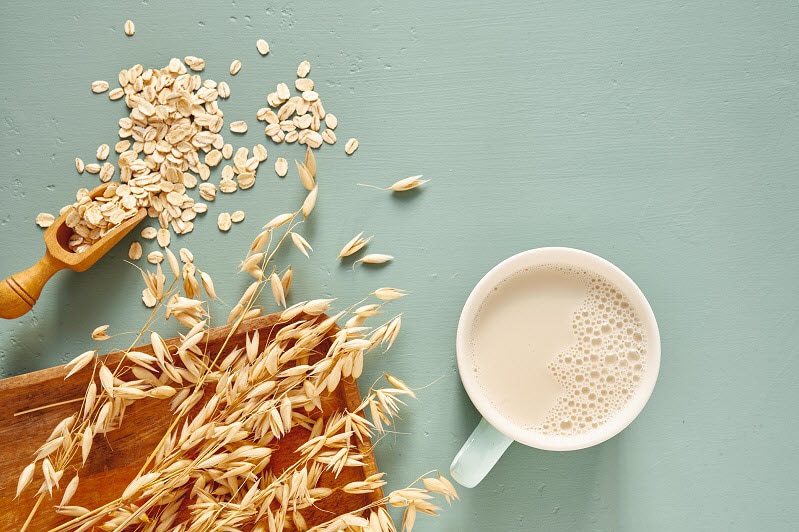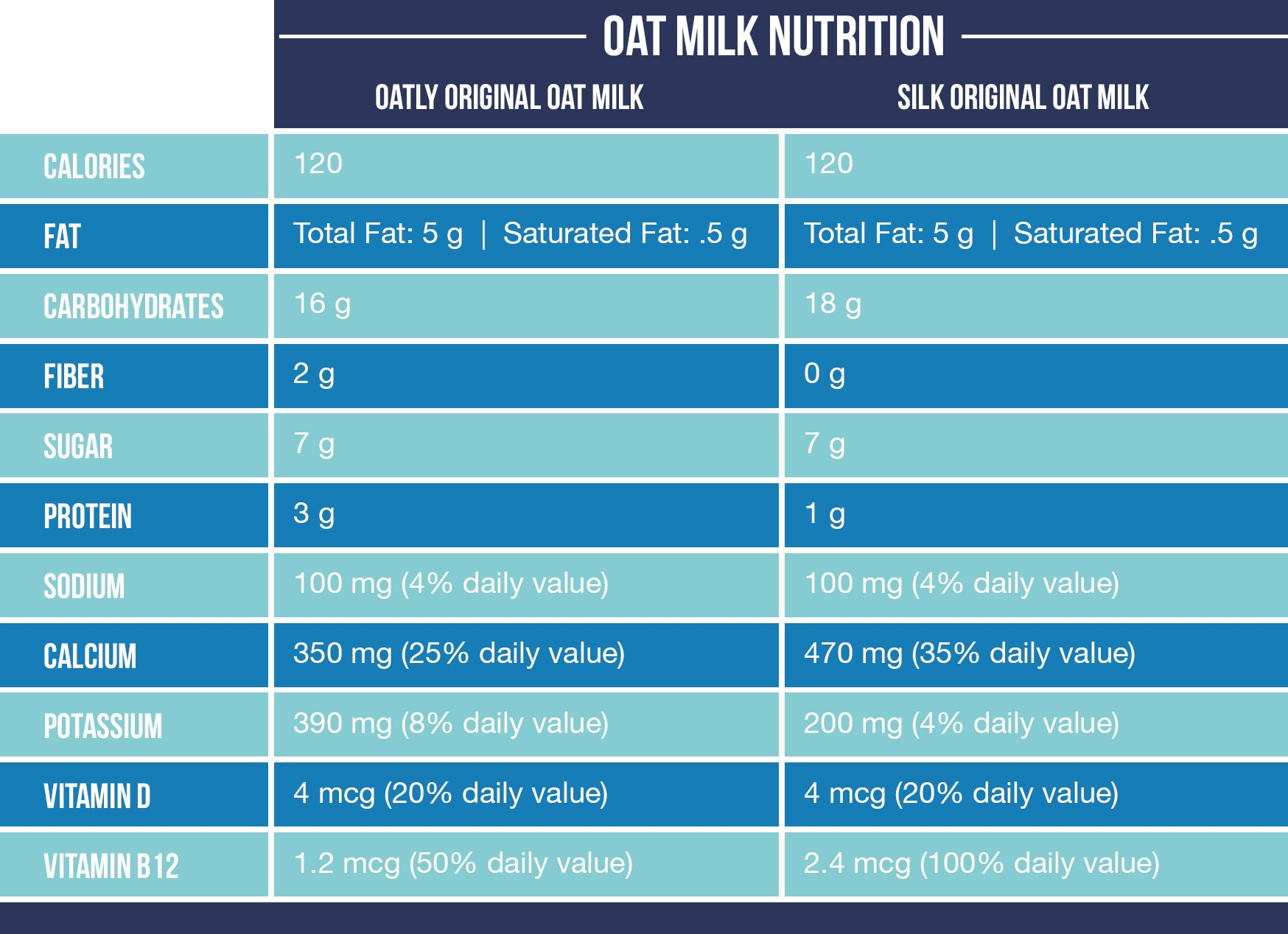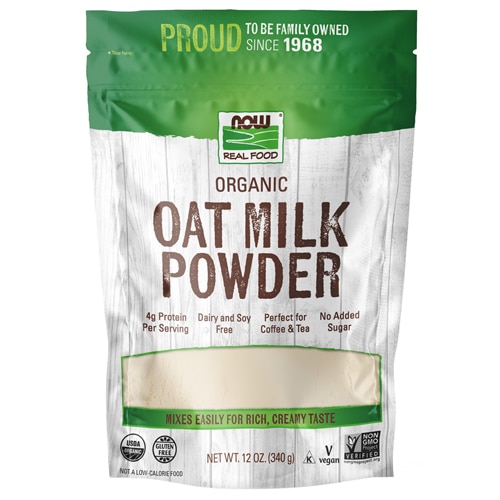[vc_row][vc_column][vc_column_text]Plant-based milks have been gaining popularity for many years now. Among the many newer types of dairy-free milks is
oat milk, which is known for being a naturally creamy milk
alternative.
While more people have been drinking oat milk, many might not know much about it. Knowing more about oat milk benefits along with its potential downsides can help you decide whether you want to try it out for yourself.

Is Oat Milk Healthy? & Other Oat Milk Questions Answered by an RD
What is oat milk and how is it made?
Oat milk is a dairy-free liquid that is made from oats. It is generally made by grinding oats with water, then straining the pulp through a fine mesh strainer or cheesecloth. The liquid that is squeezed through is what is called
oat milk, which is ready to drink. Or, it can be flavored or sweetened with things like
vanilla extract,
sugar and/or a pinch of salt.
When made in a manufacturing plant, this process uses machinery to create large batches of oat milk, and the exact process may vary between brands. Manufactured oat milk is often fortified with vitamins and minerals, and usually also contains added oil to make the milk creamier and more satisfying.
Because of its increased popularity, oat milk is easy to find in many grocery stores around the country. In addition to its traditional “milk” form, it is also increasingly popular in non-dairy versions of things like
coffee creamer and ice cream.
What are some oat milk benefits?
In addition to having a desirable creamy texture and a delicious flavor to many people, there are a few main oat milk benefits that are worth noting:
It’s a good source of many nutrients.
The nutritional value of oat milk can vary between brands. Still, similar versions of each brand typically provide a similar nutritional profile.
Here is what one cup of original oat milk from the brands
Oatly and Silk provides:

Oat milk that is fortified is a good source of vitamins like B12 and vitamin D and minerals like potassium and calcium. It’s also generally free from artificial colors and flavors, and many brands are certified non-GMO. Some brands, like
Oatly, have the added benefits of providing fiber and higher amounts of protein.
In addition, despite what the label says, most versions of oat milk provide no added sweeteners from things like cane sugar or maple syrup. Instead, the sugar that is present is naturally created as a result of the enzymes used to liquify the oats. Currently, the FDA requires any sugar that is created during the production process to be labeled as “added sugar”, even though they are not technically “added”.
Still, not all oat milks are the same. Different brands can use different methods of creating oat milk and use different ingredients in the finished product. Therefore, it’s always a good idea to read the nutrition label and ingredients list before buying.
It’s suitable for all dietary needs.
Unlike many other plant-based milks, oat milk is suitable for just about any dietary needs. It is dairy, soy and nut-free and can also be made gluten-free. This makes it a great choice for vegans, those with
food allergies and those requiring a gluten-free diet.
It may support heart health.
Oats are a type of whole grain that are naturally high in a type of fiber called
beta-glucan, which can still be present in oat milk. Beta glucan is known for its ability to help lower cholesterol levels, specifically LDL cholesterol, which is the unhealthy type. This can therefore improve heart health. An older
study showed that drinking oat milk helped lower blood levels of LDL cholesterol compared to those who drank a control drink.
In addition, the fat in oat milk comes from plant-based oils that provide predominantly unsaturated fat, compared to the saturated fat found in cow’s milk. Unsaturated fats are associated with
improved cholesterol levels and a reduced risk of heart disease.
It’s better for the environment.
Oat milk has a significantly lower climate impact than cow’s milk and some other plant-based milks.
Research has found that dairy cows are among the biggest agricultural contributors to both climate change and water pollution. In fact, cow’s milk causes around
three times as much greenhouse gas emissions, uses around ten times as much land, and two to twenty times as much freshwater compared to plant-based milks like oat milk.
When it comes to comparison between other plant-based milks, oat milk uses significantly less water for production compared to almond milk. It also produces less greenhouse gas emissions than both soymilk and rice milk.
It may help support bone health.
Like many other fortified plant-based milks, oat milk provides a good source of both calcium and vitamin D. These nutrients work together to
create strong bones and help prevent bone disorders, like osteoporosis. Drinking oat milk can help meet your daily needs for these nutrients.
Does oat milk have any downsides?
Along with oat milk benefits come a few potential downsides, such as:
It is higher in calories and carbohydrates compared to some other plant-based milks.
While oat milk is still not considered “high” in either of these nutrients, people who are looking to cut calories or carbs may be better off consuming a different plant-based milk like
unsweetened almond milk, as long as there are no dietary conflicts.
It can be high in added sugar.
Like any food or drink, flavored or sweetened versions of oat milk can be high in added sugar. That’s why it's best to choose original unsweetened versions whenever possible, rather than flavored versions like chocolate.
It’s not as high in protein as some other milks.
Oat milk doesn’t come close to matching the protein content of other milks like cow’s milk or soy milk. Still, as long as it is enjoyed in the context of an overall balanced diet, there should be no concerns about meeting your daily protein needs.
How to enjoy oat milk
Oat milk can be used interchangeably with other milks in many ways. Here are some ideas:
- Drink it on its own in place of other milk choices
- Use it when cooking oatmeal, or add it to any other type of cereal
- Use it in lattes or in place of coffee creamer
- Use it in baked goods that call for milk
- Blend it with a smoothie
- Use it recipes to create dairy-free versions of things like cream-based soups or mashed potatoes.
In summary
Oat milk is a nutrient-dense, plant-based milk. It makes a good choice for people with dietary restrictions and those who prioritize consuming foods and beverages that have a lower environmental impact. Like many foods and beverages, there are both oat milk benefits as well as potential downsides. Still, the many oat milk benefits make it a nutritious and delicious non-dairy milk alternative for most people who can enjoy it in a variety of ways.[/vc_column_text][/vc_column][/vc_row][vc_row][vc_column][vc_text_separator title="Featured Products" border_width="2"][vc_row_inner equal_height="yes" content_placement="middle" gap="35"][vc_column_inner width="1/3"][vc_single_image image="174799" img_size="full" alignment="center" onclick="custom_link" img_link_target="_blank" css=".vc_custom_1714756551036{padding-right: 7% !important;padding-left: 7% !important;}" link="https://www.vitacost.com/oatly-chocolate-oatmilk"][/vc_column_inner][vc_column_inner width="1/3"][vc_single_image image="174798" img_size="full" alignment="center" onclick="custom_link" img_link_target="_blank" css=".vc_custom_1714756574794{padding-right: 7% !important;padding-left: 7% !important;}" link="https://www.vitacost.com/now-real-food-organic-oat-milk-powder"][/vc_column_inner][vc_column_inner width="1/3"][vc_single_image image="174794" img_size="full" alignment="center" onclick="custom_link" img_link_target="_blank" css=".vc_custom_1714756590574{padding-right: 7% !important;padding-left: 7% !important;}" link="https://www.vitacost.com/califia-farms-dairy-free-oat-barista-blend-oat-milk"][/vc_column_inner][/vc_row_inner][/vc_column][/vc_row]
 Oat milk that is fortified is a good source of vitamins like B12 and vitamin D and minerals like potassium and calcium. It’s also generally free from artificial colors and flavors, and many brands are certified non-GMO. Some brands, like Oatly, have the added benefits of providing fiber and higher amounts of protein.
In addition, despite what the label says, most versions of oat milk provide no added sweeteners from things like cane sugar or maple syrup. Instead, the sugar that is present is naturally created as a result of the enzymes used to liquify the oats. Currently, the FDA requires any sugar that is created during the production process to be labeled as “added sugar”, even though they are not technically “added”.
Still, not all oat milks are the same. Different brands can use different methods of creating oat milk and use different ingredients in the finished product. Therefore, it’s always a good idea to read the nutrition label and ingredients list before buying.
It’s suitable for all dietary needs.
Unlike many other plant-based milks, oat milk is suitable for just about any dietary needs. It is dairy, soy and nut-free and can also be made gluten-free. This makes it a great choice for vegans, those with food allergies and those requiring a gluten-free diet.
It may support heart health.
Oats are a type of whole grain that are naturally high in a type of fiber called beta-glucan, which can still be present in oat milk. Beta glucan is known for its ability to help lower cholesterol levels, specifically LDL cholesterol, which is the unhealthy type. This can therefore improve heart health. An older study showed that drinking oat milk helped lower blood levels of LDL cholesterol compared to those who drank a control drink.
In addition, the fat in oat milk comes from plant-based oils that provide predominantly unsaturated fat, compared to the saturated fat found in cow’s milk. Unsaturated fats are associated with improved cholesterol levels and a reduced risk of heart disease.
It’s better for the environment.
Oat milk has a significantly lower climate impact than cow’s milk and some other plant-based milks. Research has found that dairy cows are among the biggest agricultural contributors to both climate change and water pollution. In fact, cow’s milk causes around three times as much greenhouse gas emissions, uses around ten times as much land, and two to twenty times as much freshwater compared to plant-based milks like oat milk.
When it comes to comparison between other plant-based milks, oat milk uses significantly less water for production compared to almond milk. It also produces less greenhouse gas emissions than both soymilk and rice milk.
It may help support bone health.
Like many other fortified plant-based milks, oat milk provides a good source of both calcium and vitamin D. These nutrients work together to create strong bones and help prevent bone disorders, like osteoporosis. Drinking oat milk can help meet your daily needs for these nutrients.
Oat milk that is fortified is a good source of vitamins like B12 and vitamin D and minerals like potassium and calcium. It’s also generally free from artificial colors and flavors, and many brands are certified non-GMO. Some brands, like Oatly, have the added benefits of providing fiber and higher amounts of protein.
In addition, despite what the label says, most versions of oat milk provide no added sweeteners from things like cane sugar or maple syrup. Instead, the sugar that is present is naturally created as a result of the enzymes used to liquify the oats. Currently, the FDA requires any sugar that is created during the production process to be labeled as “added sugar”, even though they are not technically “added”.
Still, not all oat milks are the same. Different brands can use different methods of creating oat milk and use different ingredients in the finished product. Therefore, it’s always a good idea to read the nutrition label and ingredients list before buying.
It’s suitable for all dietary needs.
Unlike many other plant-based milks, oat milk is suitable for just about any dietary needs. It is dairy, soy and nut-free and can also be made gluten-free. This makes it a great choice for vegans, those with food allergies and those requiring a gluten-free diet.
It may support heart health.
Oats are a type of whole grain that are naturally high in a type of fiber called beta-glucan, which can still be present in oat milk. Beta glucan is known for its ability to help lower cholesterol levels, specifically LDL cholesterol, which is the unhealthy type. This can therefore improve heart health. An older study showed that drinking oat milk helped lower blood levels of LDL cholesterol compared to those who drank a control drink.
In addition, the fat in oat milk comes from plant-based oils that provide predominantly unsaturated fat, compared to the saturated fat found in cow’s milk. Unsaturated fats are associated with improved cholesterol levels and a reduced risk of heart disease.
It’s better for the environment.
Oat milk has a significantly lower climate impact than cow’s milk and some other plant-based milks. Research has found that dairy cows are among the biggest agricultural contributors to both climate change and water pollution. In fact, cow’s milk causes around three times as much greenhouse gas emissions, uses around ten times as much land, and two to twenty times as much freshwater compared to plant-based milks like oat milk.
When it comes to comparison between other plant-based milks, oat milk uses significantly less water for production compared to almond milk. It also produces less greenhouse gas emissions than both soymilk and rice milk.
It may help support bone health.
Like many other fortified plant-based milks, oat milk provides a good source of both calcium and vitamin D. These nutrients work together to create strong bones and help prevent bone disorders, like osteoporosis. Drinking oat milk can help meet your daily needs for these nutrients.




